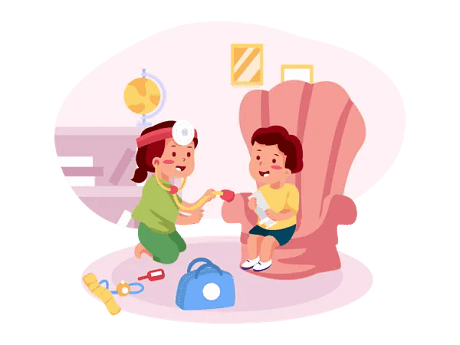
Play: A Key to Holistic Child Development
Children love to play. A parent’s success lies in realizing how play can be used to support their child’s holistic development.
The Importance of Play
Play is critical to a child’s growth and learning. It helps in the development of various skills, promotes bonding, and provides opportunities for parents to connect with their children. Through play, children learn rules of life and social behavior. From the moment parents start smiling back at their baby, they begin playing with them unknowingly.

Parents should create opportunities for their children to play with others, as many important skills and cognitive abilities are learned through social interaction during play. Healthy development depends on how much a child engages in play at different stages of life. Human brain development occurs primarily after birth, and play helps stimulate the connections between nerve cells, promoting that development. This also leads to improvements in fine and gross motor skills.
Through play, children learn to understand emotions, think critically, solve problems, develop creativity, and enhance their social awareness and language skills.
The Importance of Playing with Your Child
Today’s busy lifestyles often limit the time parents spend playing with their children. However, it is essential for both parents and children to make time for play, as it helps build long-term bonds. Playing with your child not only relieves stress for parents but also promotes mental well-being by allowing them to relax and laugh together.

Parents should encourage play for two primary reasons:
- Play is an effective medium for teaching essential life skills.
- Play strengthens the bond between parent and child.
By spending time playing with their child, parents communicate positive messages. Children begin to view the world positively and understand their importance within it. Family bonding that develops through time spent together plays a crucial role in the child’s overall growth.
Activities like going for walks, traveling together, watching movies, and listening to music contribute to a child’s development.
The Impact of Technology on Play
The rise of modern technology has significantly affected children’s play habits. As children spend more time on devices, they become more physically inactive, limiting their ability to use their imagination. Studies suggest that children under the age of 2 should not have screen time, and it is recommended that screen time be limited to a maximum of 2 hours a day for older children.
Parents should encourage outdoor play for at least 1 hour a day to ensure their child’s physical fitness. Over-reliance on mobile phones and other devices can have negative consequences on a child’s development.
Games That Can Be Played at Home
Here are some games that can be played at home, which promote mental and social development:

- Chinese Checkers
- Snakes and Ladders
- Monopoly
- Chess
- Scrabble
- Card Games
- Carrom Board
- Origami
- Puzzles
- Sudoku
Five Elements of Meaningful Play
- Children Make Their Own Decisions
When children decide what and how to play, they experience freedom of choice, which helps them understand the relationship between their decisions and outcomes. Open-ended materials, such as building blocks or reusable resources like small wooden sticks and ribbons, allow for creativity. - Children Are Intrinsically Motivated
Children have a natural desire to explore and understand the world. This motivation drives them to learn, control emotions, and regulate desires. - Children Are Engaged in the Moment
During play, children can become so engrossed that they lose track of time and their surroundings. While they play, they explore new things, learn natural laws, and differentiate between reality and fantasy. - Play is Unscripted
Play often has no strict plan. While there may be certain rules, they are often adjusted as play continues. This unpredictability helps children develop the ability to handle challenges and think flexibly. - Play is Fun
The enjoyment derived from play creates emotional connections, making the experience more meaningful. Without this emotional component, play would simply become routine or mundane.
8 Things Parents Should Know About Play
- Children Learn Through Play
Play is a key source of learning for children. They develop cognitive, physical, social, and literacy skills while engaging in play. - Play is Healthy
Play promotes physical health and helps combat childhood obesity. - Play Reduces Stress
Engaging in play helps children manage their emotional well-being, providing relief from anxiety and stress. - Play is Not Just Child’s Play
While play seems simple, it involves many complex aspects, such as how children learn, stay healthy, and balance screen time. - Make Time for Play
Parents are their children’s most important supporters, so it’s vital to ensure children have enough time to play and develop intellectually, physically, socially, and emotionally. - Play and Learning Go Hand-in-Hand
Learning and play are interconnected. The most critical knowledge for children often comes from playing with friends. - Play Outdoors
Outdoor play is essential for children’s development. Parents should encourage their kids to explore nature and engage in physical activities. - Trust Your Instincts
Play is natural, so let children have time to engage in it freely. Parents should observe how play enhances their child’s skills.
10 Ways to Encourage Meaningful Play
- Turn Off Screens
Limit TV and mobile use to encourage more active, creative play. - Allow Independent Play
Let children play on their own to help them control their activities and explore independently. - Give Children the Power to Decide
Resist the urge to control or coordinate play. When children direct their own play, they develop self-regulation and problem-solving skills. - Follow Their Interests
Engage in play based on your child’s interests. This fosters self-confidence and awareness. - Imitate, Explain, and Ask Questions
Encouraging children to talk during play helps build vocabulary and expands their thinking. - Introduce Creative Materials
Offer materials like paint and modeling clay to stimulate curiosity and creativity. - Incorporate Household Items
Everyday objects can become great tools for imaginative play. - Encourage Outdoor Play
Playing outside helps children understand cause and effect while enjoying fresh air and nature. - Create Opportunities for Social Play
Playing with other children teaches cooperation, problem-solving, and empathy. - Think Outside the Box
Be creative with play. Unusual ideas, like using rain gutters or collecting objects from nature, can make games more exciting.
Toy Buying Guide
Birth to 6 Months
- Floor gyms
- Safety mirrors
- Teething toys
- Large, interlocking rings or keys
- Cloth toys
- Soft dolls
- Stuffed animals
- Musical and chime toys
- Rattles
6 Months to 1 Year
- Balls (1 3/4 inches or larger)
- Push-pull toys
- Nesting & stacking toys
- Simple shape sorters
- Soft blocks
- Bath toys
- Teething toys
- Simple musical instruments
- Rattles
- Picture books
1 Year to 2 Years
- Balls
- Push-pull toys
- Ride-on toys
- Nesting and stacking toys
- Blocks
- Dolls and baby gear
- Play kitchen items
- Non-toxic art supplies
- Picture books
2 to 3 Years
- Balls
- Building blocks
- Puzzles
- Dolls
- Dress-up clothes
- Kitchen equipment
- Sandbox toys
- Storybooks
3 to 6 Years
- Tricycles and helmets
- Construction toys
- Art supplies
- Simple board games
- Storybooks
6 to 9 Years
- Bicycles and helmets
- Roller skates
- Sporting equipment
- Jigsaw puzzles
- Construction toys










































